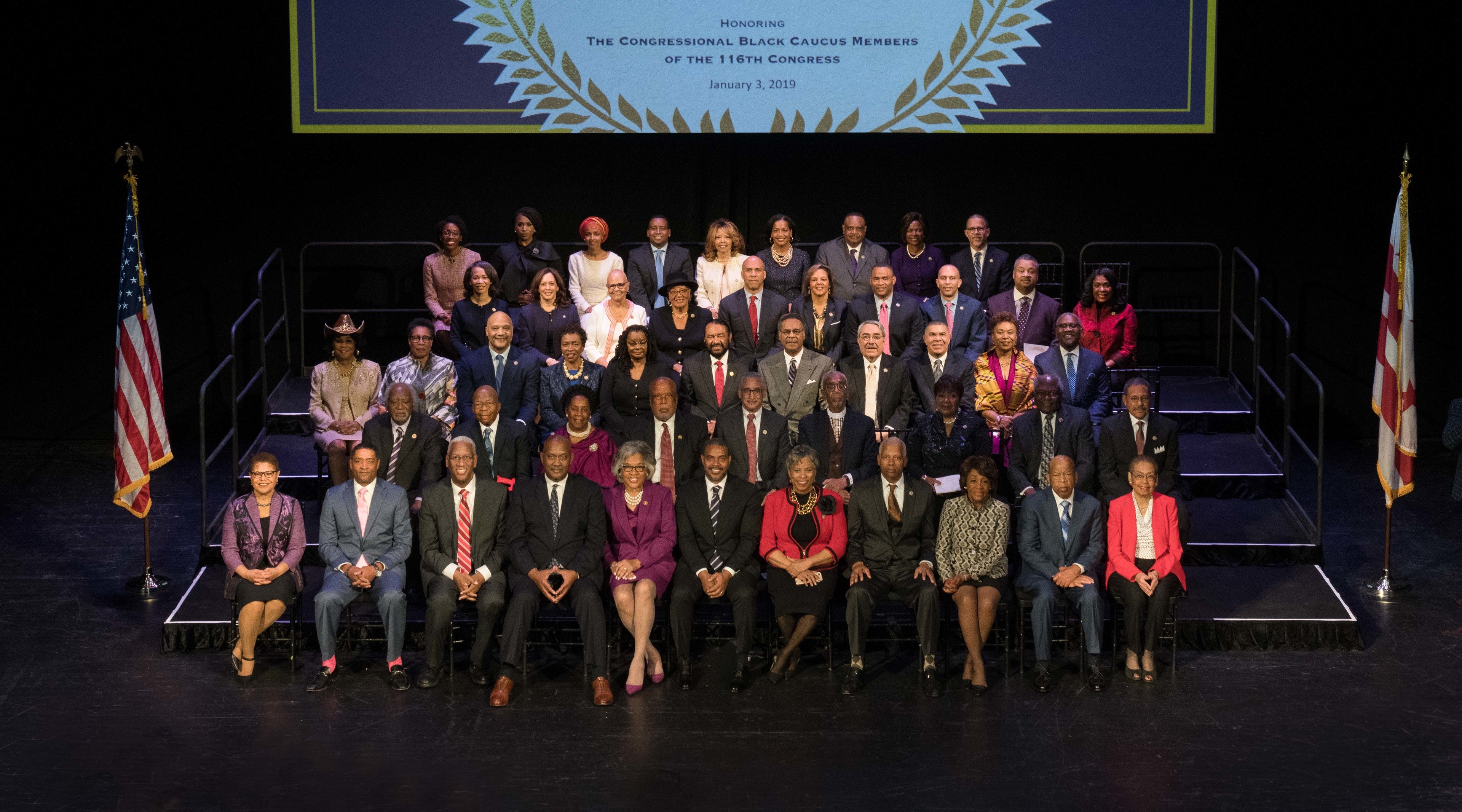WASHINGTON —Pomp, circumstance, and policy converged when the 116
th Congress convened in the nation’s capital, ushering historic numbers of women, African Americans and people of color into office.
Members of the U.S. House of Representatives and U.S. Senate were officially installed on January 3, inside the grand environs of the Capitol. That morning, a ceremonial swearing-in was held off-site for newly-elected and returning members of the Congressional Black Caucus (CBC), hosted by its non-profit foundation.
The CBC event at the Warner Theatre (Angela Rye served as mistress of ceremonies), drew a well-heeled crowd of Congressional staffers, family members, and politicos. Spotted in the multigenerational audience were the Rev. Jesse Jackson, Symone D. Sanders and Dr. Julianne Malveaux, economist and former president of Bennett College, to name a few.
The atmosphere was jubilant: prayer, musical selections (singer/songwriter Victory Boyd brought the house down) and class photos were taken.
Onstage, veteran African American legislators such as Reps. Maxine Walters (D-CA) and John Lewis (D-GA), joined new Freshmen class colleagues. The group included Black women such as Lauren Underwood (D-IL), Ayanna Pressley (D-MA), Ilhan Omar (D-MN), Jahana Hayes (D-CT), and Lucy McBath (D-GA). All garnered rousing applause.
Still, the mood was tempered by current political realities, namely, the partial shutdown of the federal government as president Donald Trump pushes Congress to secure funding for a border wall. And amid other pressing issues–gun violence, economic disparities, rising hate crimes, health care, education and more—lawmakers said it’s an important time to serve in Congress.
“The truth is—we are right in the middle of one of those historical moments where there is a concerted, a deliberate attempt to erase—to reverse policies victories not just from the Obama years, but policy victories won over the last seven decades,” said Rep. Karen Bass (D-CA), the new chair of the CBC, who succeeds Rep. Cedric Richmond (D-LA).
“… The reaction by some has essentially unleashed a dragon. …The dragon is hate—the dragon is White supremacy—and they have a leader. In the past, people would have been embarrassed to be associated with White supremacy, but today some have moved from embarrassed to emboldened.”
Against that backdrop, the new class of Congress is the most diverse ever, with more women, people of color, different religions and openly LGBTQ members. And while Republicans now firmly control the Senate, a blue wave of Democrats elected nationwide during the November 2018 midterms, have retaken the House.
African American lawmakers believe they can gain traction on key issues impacting the nation and the increasingly demographically diverse districts they represent.
“And still we rise,” said Rep. Sheila Jackson-Lee (D-TX), quoting the famous Maya Angelou poem. The chairwoman of the Congressional Black Caucus Foundation Inc., added: “[We will] march on `til victory is won.”
Indeed, Black legislators will hold more power and influence on Capitol Hill than ever before.
The CBC now boasts 55 lawmakers–nine newly elected–the largest number ever to serve in Congress since the Caucus was founded in 1971. The nation has three Black U.S. Senators: Kamala Harris (D-CA), Cory Booker (D-NJ) and Tim Scott (R-SC)— all of whom recently worked on legislation that made lynching a federal crime.
In the CBC, there’s not only Bass leading the group, but Rep. Joyce Beatty (D-OH) and Brenda Lawrence (D-MI) will serve as Vice Chair and 2
nd Vice Chair, respectively.
Moreover, African American lawmakers have assumed party leadership roles. They include Rep. James E. Clyburn (D-SC) who is Majority Whip of the Democratic Caucus, the number three leadership position. Rep. Hakeem Jeffries (D-NY) is chair of the Caucus, the number five spot. Reps. Jackson Lee and Terri Sewell (D-AL) will both serve as Chief Deputy Whips, while Barbara Lee (D-CA) co-chairs the Steering and Policy Committee.
There are also five African American members of Congress serving as full committee chairpersons.
Elijah Cummings (D-MD) will head the committee on Oversight and Government Reform, while Eddie Bernice Johnson (D-TX) will chair the Science, Space and Technology Committee. Maxine Waters (D-CA) will head Financial Services; Bobby Scott (D-VA) will chair Education and Labor; and Bennie Thompson (D-MS) will chair the committee on Homeland Security. Additionally, 28 members of the CBC will chair key subcommittees.
Congresswoman Nancy Pelosi, who is again Speaker of the U.S. House of Representatives, was among the guest speakers at the CBC ceremony, along with Majority Leader, Steny Hoyer (D-MD).
Pelosi ticked off agenda items that included children, eradicating poverty and passing Voting Rights Act legislation. “We have important work to do in this Congress,” she said. “Only a few times in history have we had the challenges we have today.”
Fellow members of Congress agreed. Rep. Robin Kelly (D-IL) told Essence in a recent interview she’ll double down on efforts to combat gun violence, while Rep. Brenda Lawrence (D-MI), a one-time postal worker, said she’ll continue to fight for working families. Underwood, a former nurse, vowed to focus on health care, including protecting of the Affordable Care Act.
Val Demings (D-FL), a former law enforcement officer, said in a statement that among her priorities is “keeping our neighborhoods safe, holding this Administration accountable to the rule of law, and continuing our work on comprehensive criminal justice reform.”
Swearing-in day on Capitol Hill was a mix of official photos and selfies, receptions and tours, but it wasn’t all pomp and pageantry: votes were taken on issues. And lawmakers have already introduced a range of measures. They run the gamut from H.R. 1, a sweeping package aimed at improving election integrity, big money in politics and voting rights, to an impeachment resolution aimed at Trump.


